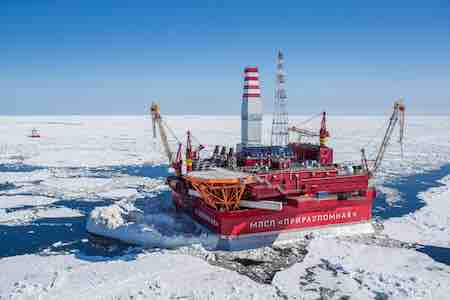May 2016, Vol. 243, No. 5
Web Exclusive
Why The Arctic Oil Dream Is Not Over Yet

The race to discover oil and gas in virgin Arctic waters is now on, as Norway offered oil majors a lifeline on Wednesday by opening up what experts say could be home to 15 percent of the world’s undiscovered oil and 33 percent of the world’s undiscovered natural gas.
Norway officials on Wednesday awarded 10 new oil and gas licenses to explore the untapped area of the Arctic Barents Sea, an area that until 2011, was disputed for almost 40 years with Russia.
The drilling licenses consist of 40 blocks that were awarded to 13 oil companies. Of the licenses granted, 13 companies were offered participating interests, and five were offered operating licenses.
Companies gaining licenses include Centrica, Tullow Oil, Statoil, Chevron, and Lukoil.
Statoil, Norway’s largest oil explorer and producer, has been awarded five of the coveted Arctic licenses. It expects to drill the first well in 2017. Statoil had previously been forced to cut its Norway drilling activity in 2015 after oil prices slumped, drilling only 16 wells in the area in 2015, down from 21 in 2014. By the end of 2015, Statoil’s 2016 outlook for its Arctic activities seemed bleak, and more cuts were expected. But Wednesday’s new licenses for unexplored areas bring new optimism for Statoil.
“The Norwegian continental shelf (NCS) is the core of Statoil’s business, and we are very pleased with the award in the 23rd licensing round, which will strengthen our exploration portfolio. Gradually opening up new areas is crucial for us to maintain profitable and high-level production up to and beyond 2030,” said Arne Sigve Nylund, Statoil’s executive vice president for Development & Production Norway.
Norway’s move to open up its virgin Arctic waters seems to come at a strange time, only days after Norwegian leaders, along with leaders from Denmark, Finland, Iceland, and Sweden traveled to Washington last Friday to discuss, among other things, climate change and the precarious state of the Arctic. Friday’s meeting concluded with Norway signing an Arctic protection agreement amid growing concerns from environmental groups that oil spills and greenhouse gases may endanger Arctic wildlife.
And just last Tuesday, oil majors including Shell, ConocoPhillips, and Eni relinquished $2.5 billion oil and gas leases in another part of the Arctic in the Chukchi and Beaufort Seas after being squeezed by low crude prices.
For Norway, stabilizing offshore activities couldn’t come soon enough. Norway’s oil output has seen a 50 percent drop since 2000, and it lost 25,000 oil-related jobs in the last three years, which accounts for 11 percent of Norway’s oil-industry workforce.
Norway’s oil minister, Tord Lien, said “The Barents Sea offers great new opportunities. The industry’s interest in new acreage shows that the Norwegian continental shelf remains attractive. The potential is huge.”
By Julianne Geiger for Oilprice.com





Comments